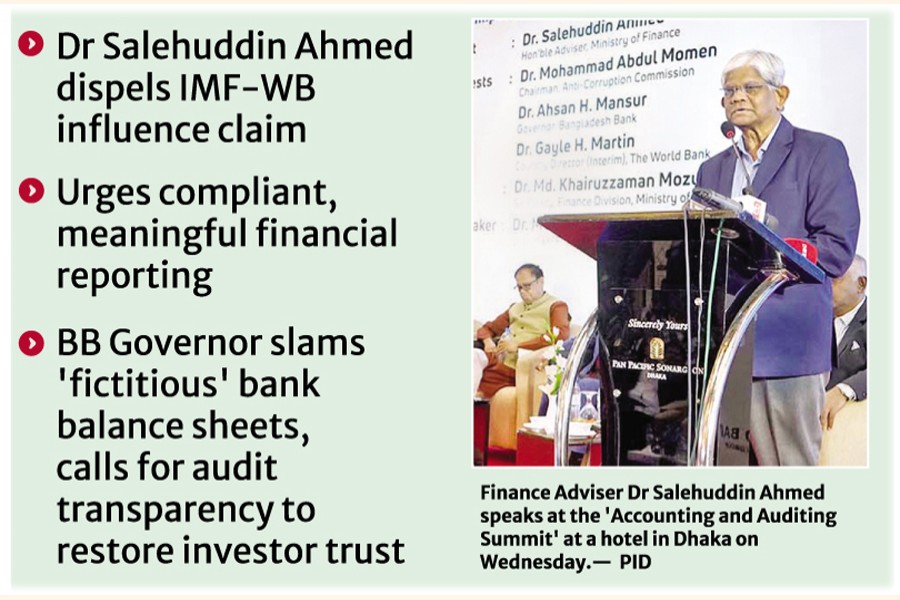
Published :
Updated :

The ongoing financial sector reforms in Bangladesh are being driven by national interest, not dictated by global lenders, said Finance Adviser Dr Salehuddin Ahmed on Wednesday.
"These reforms are taking place out of our own need, for our own benefit," he told a summit of accounting and auditing professionals in Dhaka. "Many people claim they are being done at the behest of the World Bank or the IMF, but that is not the case."
Speaking as the chief guest at the Accounting and Auditing Summit, jointly organised by the World Bank and the Financial Reporting Council (FRC), Dr Ahmed added that the government is open to adopting good ideas from any source.
"If global agencies offer better suggestions, there's no harm in accepting them," he told the summit titled 'FRC's Role in the Economic Governance of Bangladesh' at a city hotel.
Bangladesh Bank Governor Dr Ahsan H. Mansur, acting World Bank Country Director Souleymane Coulibaly, and Anti-Corruption Commission (ACC) Chairman Dr Mohammad Abdul Momen attended as special guests.
Finance Secretary Dr Md Khairuzzaman Mozumder chaired the event, while FRC Chairman Dr Md Sajjad Hossain Bhuiyan delivered the keynote speech.
Dr Ahmed stressed that both public and private sector institutions must maintain proper audit and financial reporting standards. He also expressed concern over the narrow tax base in the country.
"I was surprised to learn that only 1.8 million people submitted tax returns, and 70 per cent of them declared zero tax," he said, implying that a much larger population earns taxable income.
All financial reporting must be compliant, he added, and encouraged auditors to go beyond rulebooks and apply professional judgement to ensure that audits are meaningful and purposeful.
He noted that a "significant number" of financial reports still fail to meet the required standards.
Bangladesh Bank Governor Dr Mansur underscored the importance of transparent, accurate audit reports, especially from banks, to build trust among local and international investors.
"You cannot improve a country's macroeconomic situation if financial reporting is substandard," he said. "Many problems in the economy are also reflected in financial reports."
He criticised the quality of balance sheets in the banking sector: "If you look at the balance sheets of various banks, most of them are fictitious." Without better audit quality and reporting, investor confidence cannot be restored, he warned.
Dr Mansur also announced that Risk-Based Supervision (RBS) will be rolled out across all banks from January 1, 2026, aiming to create a more sound, resilient, and future-ready financial system.
He appealed for technical -- not just monetary -- support from development partners to build talent in the financial sector.
Meanwhile, ACC Chairman Dr Momen called on auditors to maintain honesty and regulatory compliance.
Citing a scandal involving IFIC Bank, he said: "Salman F Rahman took money by presenting inflated figures from a paper-only company, aided by false audit reports."
The central bank failed to act on repeated financial irregularities during the previous regime, he said, adding that it "could not even protect its own funds."
In his keynote, FRC Chairman Dr Bhuiyan said strong institutions and good governance are increasingly critical as Bangladesh moves toward upper-middle-income status.
"The Financial Reporting Council stands with a clear mandate to promote integrity, discipline, and transparency in financial reporting, auditing, valuation, and actuarial standards," he said.
Dr Bhuiyan also urged all parties to produce accurate financial statements with full disclosure to maintain economic discipline, and to help the National Board of Revenue (NBR) collect appropriate amounts of income tax and VAT.
saif.febd@gmail.com


 For all latest news, follow The Financial Express Google News channel.
For all latest news, follow The Financial Express Google News channel.